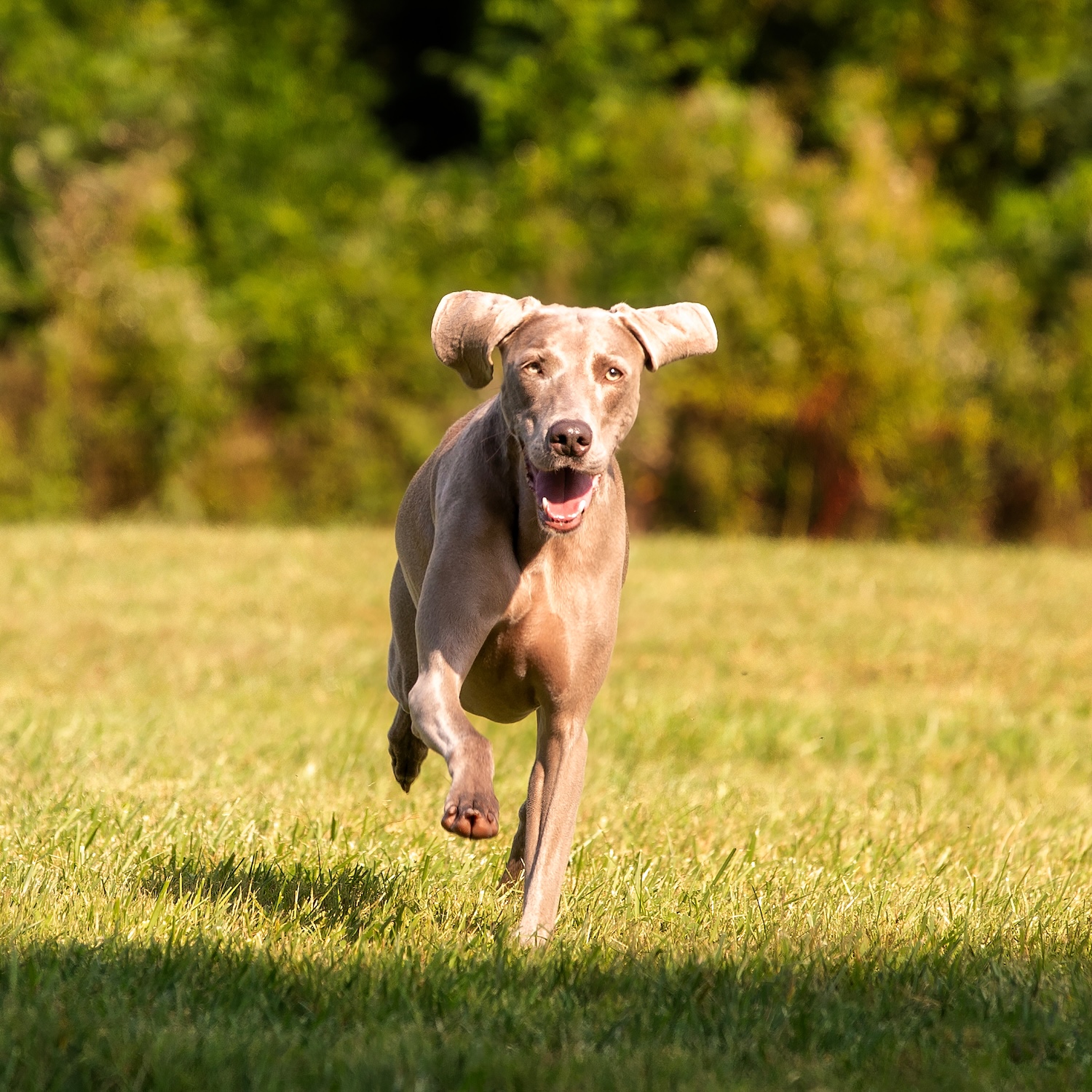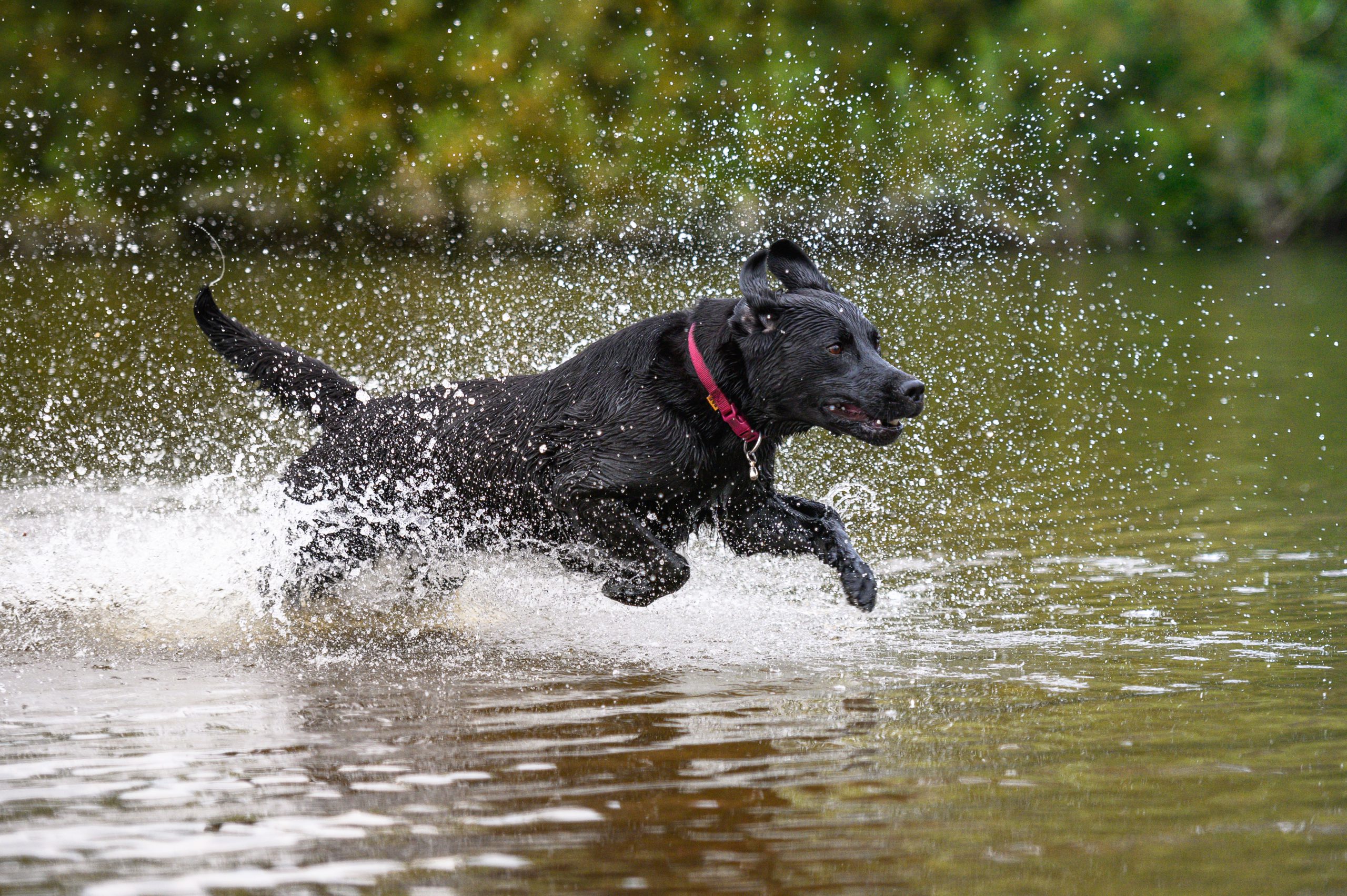Feisty, friendly, affectionate (and don’t forget flatulent): to know a French bulldog is to love them. And boy, are they loved, consistently ranking as one of the most popular dog breeds in the U.S. year after year. In fact, they are now the second most popular dog breed in the country according to the American Kennel Club.
From their playful personalities to their endearingly oversized ears, there are countless reasons for the enduring popularity of these quirky companions. But many of the features that make Frenchies loveable also require special care, which is why it’s important to get to know the breed before adopting.
From their history and personality to their health needs, here is what you need to know about living well with a French bulldog.
Basic French bulldog facts
The AKC classifies the French bulldog as a “non-sporting” dog.” Frenchies are active, muscular dogs, but due to the physical limitations that go along with their extra-short noses, they aren’t what you’d call an all-round athlete or sports companion. They’re compact, standing from 11-13 inches tall and topping out at 28 pounds. Their trademark features include a large head with an expressive, wrinkled face, flat nose, and prominent eyes, and, of course, those enormous bat ears. Their smooth coats come in a range of colors—the AKC recognizes brindle, cream, fawn (light to dark), black, and pied (spotted mixes of approved colors).
The playful personality of the French Bulldog
Frenchies are companion dogs through and through. They generally love to play and cuddle and become extremely excited when they see their loved ones—they’ve earned a rep for their wiggly butts for a reason.
They’re also known for their snorting, snoring, wheezing, and farting. Frenchies do tend to make a lot of noise when they play, sleep, and eat. But one noise many French bulldogs don’t make excessively: barking. While there are, of course, exceptions, Frenchies are not known to be overly barky on the whole, which is why they make relatively good watch dogs; when they bark, there’s a reasonable chance that they’re alerting you to something.
“Our Maxie is a true Frenchie. He is a goofball, and does a wiggle-butt dance when we come home from being out. He is super smart and loves being with his humans. We love him so much that we forgive the farts and the snorts.” — Marissa, mom to French bulldog, Maxie
They are generally dog- and kid-friendly, though some Frenchies have a relatively high prey drive and need ample training to be around cats or other small animals.
“They’re perfect apartment dogs,” says Kristi Ralph, a longtime volunteer, communications specialist, writer, and foster parent with the French Bulldog Rescue Network. “They don’t need a lot of space. They do like to go for walks: they’re very nosy, and they like to people-watch and be up in people’s business.”

It almost seems like they were bred to stick by their humans’ side. And in a way, they were.
A brief history of the French bulldog
As the name implies, the French bulldog is a type of bulldog, descended from an earlier version of the English breed that many people know and love today. They get their wide stance, large head, flat snout, and strong jaws from those former bull baiters, though as you might have guessed, they originated in France.
When English lacemakers moved to Normandy en masse in the 19th century, they took with them the English bulldogs who were considered too small, had “tulip” ears (erect ears with drooping tips), or were otherwise not up to breeding standards, and used them for both ratting and companionship.
These lacemakers bred the undersized bulldogs they brought to France with local ratting terriers and, behold, the French bulldog (or Bouledogue Français) was born.
Almost immediately, these diminutive dogs became wildly popular with royalty and rapscallion alike—they gained special notoriety for their friendship with “les belles de nuit” (prostitutes) of Paris. The Frenchie has had countless famous supporters from their earliest days to today: Everyone from artist Henri de Toulouse-Lautrec, who painted his French bulldogs, to Martha Stewart, who often writes about her pups on Instagram, are among the many big-name Frenchie fans.

The breed found its way to America near the end of the 19th century and was officially recognized by the AKC in 1898.
The modern Frenchie has changed considerably since they were first bred. While the original French bulldog build was more akin to what we would recognize as a Boston terrier, today’s Frenchie is shorter and wider in build and flatter of snout. Because of their anatomy, the overwhelming majority of breeding dogs must be impregnated via artificial insemination, and Cesarean sections account for 80% of French bulldog births due to the narrow hips of birthing dogs and the wide heads of puppies.
Healthy lifestyle for a French bulldog
As true companion dogs, Frenchies thrive on human attention. Though they are well-suited to apartment living, they’re not dogs that should be left alone without mental stimulation or human contact for long periods of time (though, really, no dog is).
And as you indulge your Frenchie with cuddles and play, don’t forget they also need training.
Training and exercise
French bulldogs are seriously intelligent—and can be seriously stubborn. And like other small, human-centric breeds, they sometimes get away with cheeky behavior because of the “cute excuse.” Just like any other dog, regardless of stature, a Frenchie will benefit from early socialization, consistent training and boundary-setting. The great news is that though headstrong, Frenchies tend to love pleasing their people so they take well to training.
Introduce your Frenchie to a wide variety of people, animals, and situations from a young age, if possible. Use a crate to teach potty training and boundaries in the house. Ralph notes that Frenchies are likely to suffer from “selective hearing” so consistency is one of the most important aspects of training. For example, begging—for both food and attention—is a learned behavior, so avoid letting them paw at you for attention and don’t get in the habit of sharing table scraps with them.
Practice training with your Frenchie for at least a few minutes every day, even if it’s as simple as making them sit before meals. Consistency will pay dividends for this breed, which can run roughshod over owners who don’t set boundaries.
“They’re so funny and social, but, oh man, they need someone to show them the ropes and be consistent,” Ralph says.
Despite their desire to be in the thick of things, their brachycephalic (which means, literally, short-headed) anatomy means that French bulldogs can’t join you on every adventure.
Frenchies aren’t lazy by any means, but they’re also not suitable running or hiking partners as their short snouts make it difficult for them to regulate their body temperature. Overheating is easy for Frenchies–and dangerous. Don’t let them over-exert themselves in warm weather. Keep them cool indoors and outdoors. As with all breeds, Frenchies do need exercise for physical and mental wellness—you’ll just need to find the right balance of activity, comfort and safety. Aim for 60 minutes of exercise for a healthy adult Frenchie. But keep each walk or exercise session short (15-20 minutes per) and low-intensity. In warmer weather, aim for mostly morning or evening walks. Along with walks, you can factor indoor play into their daily exercise allotment. And be sure to bring a collapsible water bowl wherever you go when it’s above 70 degrees.
Get pet insurance
The number one reason people surrender their Frenchies is due to the high cost of care this breed requires, so Ralph emphasizes the importance of signing up for pet insurance for your Frenchie as soon as possible. Because there is a higher incidence of many health conditions among Frenchies, insurance can save you thousands of dollars and secure necessary medical care for your dog should they need it down the line.
Common health concerns for French bulldogs
Spinal problems: The Frenchie shape—arguably one of the most endearing traits for fans of this breed—is the source of one of the most persistent and serious health problems. Frenchies can suffer from degenerative myelopathy, a progressive disease that slowly weakens the spinal cord and affects mobility, and intervertebral disk disease (IVDD), or herniated discs in the neck and back. Signs of this condition may include dragging or weakness of the hind limbs, reluctance to move, a hunched back or neck, or crying out in pain. If you notice any of these symptoms, bring your dog to the vet immediately—prompt treatment can make a huge difference in their prognosis.
One way to prevent or minimize spinal problems is to not let your Frenchie jump on and off furniture. Instead, provide stairs or a ramp so they can come and go as they please without damaging their legs and back. Managing their weight is also important in safeguarding their spine health.
Brachycephalic airway syndrome: Brachycephalic syndrome is found in flat-faced dogs like Frenchies, English bulldogs, pugs, and boxers. It refers to a combination of physical characteristics including an elongated soft palate that can interfere with air flow into the lungs; stenotic nares, or narrow nostrils; a narrow trachea, or windpipe; and everted laryngeal saccules, whereby sacs within the airway are pulled into the trachea and potentially obstruct airflow.
In short, brachycephalic dogs have obstructed airways, which can cause labored breathing (that trademark snuffling and snorting and snoring), retching while swallowing, intolerance of heat and exercise, and even collapse of the airway.
Being overweight exacerbates brachycephalic syndrome, so keeping your Frenchie at an ideal weight is key. Keeping exercise to moderate levels and avoiding overheating can help manage the condition for dogs with mild signs. There are various options to help relieve the symptoms of this condition, but surgery is typically recommended when a dog’s breathing is interrupted.
If you’re considering bringing a Frenchie home, speak to a veterinarian about brachycephalic syndrome and what it can mean for you and your dog.
Allergies: Many Frenchies deal with both food and skin allergies; it’s the second most common reason people surrender their Frenchies according to Ralph. Common symptoms of allergies are excessive scratching, licking paws, sneezing, visible patches of scaly or raw skin, and even diarrhea.
Frenchies’ wrinkly faces can also promote dermatitis, signs of which can include itching and redness. Be sure to keep your dog’s nasal and tail folds clean, and dry them thoroughly after baths and anytime they get wet or dirty. Speak with your veterinarian about medicated shampoos and wipes for Frenchies experiencing skin problems as these can help reduce and prevent infection.
Eye problems: Their big eyes make Frenchies irresistible to lovers of the breed, and more prone to problems like injuries and infection. Corneal ulcers, caused by trauma to the eye, are common, as are conjunctivitis, and “cherry eye” where red tissue sticks out of the corner of the eye socket. Cherry eye can be painful and can often require surgery. If left untreated it can result in permanent dry eye.
Monitor your Frenchie’s peepers and speak to your vet at the first sign of red, squinty, itchy, goopy, or otherwise unwell eyes.
Ear infections: Again, a defining Frenchie trait can be the source of a common health problem. French bulldogs’ bat ears feature wide openings but narrow canals which provide an ideal environment ideal for bacteria and yeast to grow. Frenchies are also prone to allergies which can produce secondary ear infections. Watch for excessive scratching and redness of the ears and speak to your vet if you notice these signs—they can recommend a course of action based on the severity of the infection. Your vet may also recommend regularly cleaning your Frenchies ears with an approved ear cleaner, as this can help prevent ear infections.
Flatulence and digestion problems: Though somewhat of a joke among Frenchie owners, these dogs really do seem to have a particular gift for clearing the room with their gas. Due to their sensitive stomachs, French bulldogs often let rip in ways that make sulfur pits seem positively floral.
Gas and stomach upset can have many causes, but diet is a good place to start in addressing the issue. Dry dog food tends to contain a lot of starchy fillers, which can contribute to a gas problem. Feeding a high-quality, highly digestible diet that’s made with human-grade meat and vegetables may help reduce or eliminate digestion problems—many customers of The Farmer’s Dog report that their Frenchies fart less on fresh food!
Obesity: While obesity is a problem for all dogs, with about half of American dogs being reported as overweight or obese, it’s a particularly serious issue for Frenchies. Obesity can compound the joint and spinal deterioration to which they’re prone.

Feeding your Frenchie
As with any breed of dog, it’s important to feed French bulldogs healthy, complete and balanced food on a regular schedule. Here are some additional considerations for feeding your Bouledogue Francais:
Practice portion precision: Because Frenchies are so small, and prone to joint and spine issues, it is of the utmost importance to make sure you don’t overfeed them and that you feed high quality, healthy food. A fresh food plan is a good choice for your Frenchie because it comes in pre-portioned packs based on each dog’s specific needs.
“As a puppy he liked to chew on sticks and carry them around, but it would give him terrible stomachaches. Anything but The Farmers Dog fresh food gives him AWFUL gas. If we feed him any table scraps—it could be one small piece of meat—he will fart all night.”— Madison, mom to French bulldog Kylo
Keep it clean, and digestible: Fresh, whole food can be a big help for dogs notorious for digestive issues and allergies. First, when it comes to allergies, it’s important to know exactly what you’re feeding, something that can be impossible with kibble, which often contains ingredients not listed on the bag. Allergic reactions and intolerances to food are fairly common in dogs and many people notice symptoms clear up when they switch to fresh food.
And research has shown that fresh, lightly cooked food is more digestible than dry diets. That means your dog is getting more of the powerful nutrition in the food. Studies have even shown that dogs eating fresh food have smaller, less stinky poops— and numerous Frenchie owners have noted that their dogs’ gastrointestinal issues have improved greatly when they switched to fresh food.
“We switched to Farmer’s Dog and that has alleviated many of his skin allergies and tummy troubles!” — Maxie’s mom, Marissa
A healthy diet—alongside exercise, training, vet care, and ample cuddling time—is among the keys to giving your Frenchie a happy (potentially less smelly) life.
If you’re considering bringing a French bulldog home, do your research. Learn about the special health, and financial challenges you may confront, and, relatedly, about what constitutes responsible breeding. Because demand for Frenchies is so high, there has been an explosion of French bulldog breeders. When looking for a reputable bulldog breeder, ask what genetic and health testing they conduct, what certifications their breeding dogs have, and how long the waitlist is. Or, try rescuing a Frenchie, or a similar mixed-breed dog. Despite the high demand for this dog, there are many French bulldogs seeking homes—with some patience, you can typically find any dog breed through a rescue organization.




